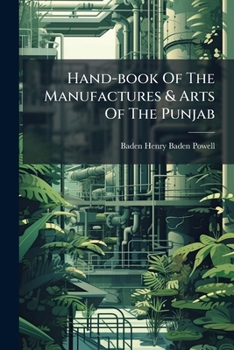Hand-book Of The Manufactures & Arts Of The Punjab
Hand-book Of The Manufactures & Arts Of The Punjab offers a detailed exploration of the industrial landscape and artistic traditions of the Punjab region. This volume serves as a comprehensive guide to the various trades, crafts, and manufacturing processes prevalent in the area, supplemented by a glossary and index of vernacular terms to aid understanding and accessibility. Prepared under the orders of the government, this book forms the second volume to the "Hand-book Of The Economic Products Of The Punjab", presenting a valuable resource for those interested in the economic and industrial history of the region.
Baden Henry Baden-Powell provides an in-depth look at the diverse range of industries, from textiles and metalwork to pottery and woodwork, showcasing the skills and techniques employed by local artisans. This book is a vital resource for historians, economists, and anyone seeking to understand the rich heritage of Punjab's manufacturing and artistic communities. A classic study offering enduring insights into the region's economic past.
This work has been selected by scholars as being culturally important, and is part of the knowledge base of civilization as we know it. This work was reproduced from the original artifact, and remains as true to the original work as possible. Therefore, you will see the original copyright references, library stamps (as most of these works have been housed in our most important libraries around the world), and other notations in the work.
This work is in the public domain in the United States of America, and possibly other nations. Within the United States, you may freely copy and distribute this work, as no entity (individual or corporate) has a copyright on the body of the work.
As a reproduction of a historical artifact, this work may contain missing or blurred pages, poor pictures, errant marks, etc. Scholars believe, and we concur, that this work is important enough to be preserved, reproduced, and made generally available to the public. We appreciate your support of the preservation process, and thank you for being an important part of keeping this knowledge alive and relevant.





